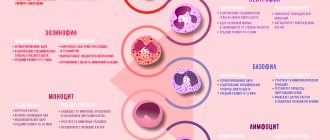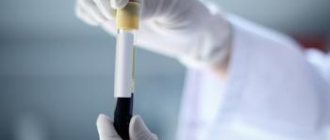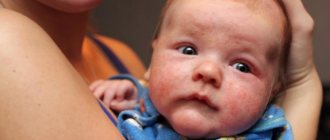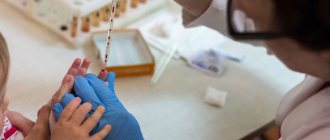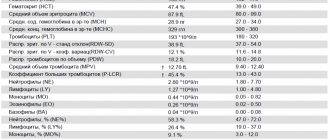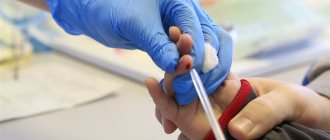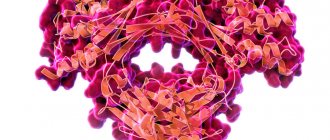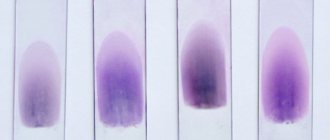General rules for preparing for blood tests
In all cases, before donating blood, it is recommended to adhere to several rules:
- Blood is donated in the morning on an empty stomach (or in the afternoon and evening, 4-5 hours after the last meal). Blood counts can change significantly throughout the day, so it is recommended that all tests be taken in the morning.
- Do not eat fatty foods several hours before the test, it is advisable not to eat for 4 hours - a high concentration of fats in the blood can interfere with any test.
- Shortly before taking blood, drink 1-2 glasses of ordinary still water; this will reduce the viscosity of the blood, and it will be easier to take a sufficient volume of biomaterial for research; in addition, it will reduce the likelihood of clots forming in the test tube.
- If possible, stop taking medications at least a day before the test.
- When taking tests while taking medications, you must indicate this fact on the referral form.
- It is recommended not to exercise on the day of the test.
- On the day of the test, it is recommended to exclude increased emotional stress.
- On the day of the test, it is recommended to take a comfortable position (sit down), relax, and calm down a few minutes before taking blood.
- Avoid drinking alcohol for 72 hours before taking the test.
- Do not smoke at least 30 minutes before blood collection.
- Clarify the optimal days of the menstrual cycle (or pregnancy period) for donating blood for sex hormones.
- FSH is follicle stimulating hormone. A woman should be tested for this sex hormone on days 3-7 of the cycle. To determine the possibility of follicle growth, FSH is taken on days 5-8 of the cycle;
- LH – luteinizing hormone. LH in men is responsible for increasing the permeability of the seminiferous tubules to testosterone. LH in women ensures completion of egg maturation in the follicle and ovulation, secretion of estrogen and formation of the corpus luteum. Women should undergo a blood test for LH on days 3-8 of the cycle;
- Prolactin . If prolactin levels are elevated in a man, sexual function may be impaired. In women, prolactin takes part in the ovulation process and stimulates lactation in the period after childbirth. To determine the level of this hormone, the analysis should be carried out in phases 1 and 2 of the menstrual cycle, and the sample should be taken only in the morning on an empty stomach. Before blood sampling, the patient is recommended to spend 30 minutes at rest, since prolactin is a stress hormone, as a result of which slight physical activity or anxiety can affect its level;
- Estradiol . In women, analysis can be taken at any phase of the menstrual cycle. Estradiol in women ensures the formation and regulation of menstrual function and the development of the egg;
- Progesterone . This hormone is responsible for ensuring the final preparation of the uterine lining for the embryo to attach. Progesterone provides optimal conditions for pregnancy to develop. The test is scheduled for days 19-21 of the menstrual cycle;
- Testosterone . Testing of this hormone in women can be carried out on any day of the cycle. If a man’s concentration has decreased, this entails a decrease in sperm quality and insufficient virility;
- DHEA sulfate . If the concentration of the hormone is increased in a woman, this may cause disruption of the ovaries and infertility. A woman’s hormone levels can be checked on any day of her cycle.
General rules
- For most studies, it is recommended to donate blood in the morning, from 8 to 11 o’clock, on an empty stomach (at least 8 hours must pass between the last meal and blood collection, you can drink water as usual), and on the eve of the study, have a light dinner with limited intake of fatty foods. For tests for infections and emergency studies, it is acceptable to donate blood 4-6 hours after the last meal. If you are taking medications, be sure to notify your doctor.
- Donate blood for gastrin-17, lipid profile (total cholesterol, HDL cholesterol, LDL cholesterol, VLDL cholesterol, triglycerides, lipoprotein (a), apolipoprotein A1, apolipoprotein B) and glucose tolerance test should be strictly on an empty stomach, after 12-14 hours hunger.
- 24 hours before the test, you must avoid alcohol, intense physical activity, and taking medications (in consultation with your doctor).
- 1-2 hours before the test, you must refrain from smoking, do not drink juice, tea and coffee, and you can drink still water. Avoid physical stress (running, quickly climbing stairs), emotional excitement. It is recommended to rest and calm down 15 minutes before donating blood.
- You should not donate blood for laboratory testing immediately after physiotherapeutic procedures, instrumental examination, X-ray and ultrasound examinations, massage and other medical procedures.
- When monitoring laboratory parameters over time, it is recommended to conduct repeated tests under the same conditions - in the same laboratory, donate blood at the same time of day, etc.
- Blood for research must be donated before starting to take medications or no earlier than 10-14 days after stopping them. To assess the control of the effectiveness of treatment with any drugs, a study should be conducted 7-14 days after the last dose of the drug.
General rules for preparing for urine tests
Single sample urine tests
Depending on the required laboratory tests, the first, middle, third (usually morning) or “one-time” (independent of the collection sequence) portion of urine can be used for analysis. Urine for testing is collected by the patient in a sterile plastic container.
To obtain reliable results, it is recommended to comply with the following conditions:
- It is not recommended to consume on the eve of the study (10–12 hours before): alcohol, spicy, salty foods, foods that change the color of urine (for example, beets, carrots);
- If possible, avoid taking diuretics;
- Before taking the test, perform a thorough toileting of the external genitalia;
- For women, the study is recommended to be carried out before menstruation or 2 days after its end;
- The PCR method for diagnosing urogenital infections in urine is suitable exclusively for men; in women, this diagnostic method is much inferior in its information content to the study of a urogenital smear and is not used.
Daily urine tests
urine sample is all urine collected over a 24-hour period.
Daily urine is most often collected by the patient independently at home using a special kit for collecting and transporting a daily urine sample. Before the collection begins, the patient is given the necessary instructions about the collection procedure and the necessary measures to prepare for the test.
To obtain reliable results, it is recommended to comply with the following conditions:
- It is not recommended to consume on the eve of the test (10–12 hours before): alcohol, spicy, salty foods, foods that change the color of urine (for example, beets, carrots).
- If possible, avoid taking diuretics.
- Before taking the test, perform a thorough toileting of the external genitalia.
- For women, testing is not recommended during menstruation.
What does a general blood test show?
The doctor compares the results of a clinical blood test with the standards. Deviations from the norm make it possible to determine the nature of the pathology.
Normal indicators:
- Red blood cells - approximately 3.8-5.5 x 10¹²/l for children and women, for men about 4.3-6.2 x 10¹²/l.
- Hematocrit - for men in the range of 39-49%, for women approximately 35-45%.
- Hemoglobin (structured protein) – within 120-140 g/l.
- Platelets (blood plates) – about 180 – 320 × 109/l.
- Leukocytes – should not exceed 4.0 – 9.0 × 109/l.
- Lymphocytes – 3.0 × 109/l.
- ESR – for women no more than 15 mm/h, for men up to 10 mm/h.
Red blood cells help transport oxygen to tissues. If there is not enough of them in the blood, anemia develops, and if there is an excess, cardiac pathology or chronic lung anomalies can be diagnosed. An increase in red blood cells is also recorded during overheating and during physical exertion.
An insufficient amount of hemoglobin in the blood can be observed in patients with a lack of iron in the body. Elevated protein levels indicate the development of blood diseases. A lack of platelets is often diagnosed in patients with hemophilia. With anemia, liver pathologies and thyroid diseases, an increase in the level of blood platelets is observed.
An increase in the number of white blood cells signals that the body is infected with bacteria, viruses or fungi. There are quite a few diseases in which this indicator increases, but they can also progress in completely healthy people, for example, in pregnant women or in women before menstruation. A decrease in the level of white blood cells can be diagnosed during viral hepatitis, measles, malaria and other infections.
A general blood test helps the doctor find the direction in which to look for the cause of the ailment; relying only on the results of this study alone, it may be impossible to make an accurate diagnosis. Therefore, if there are deviations from the norm, additional diagnostic procedures may be prescribed.
To take a general blood test, contact a medical office in Vidnoye and Moscow (near the Kolomenskaya metro station and the VDNKh metro station)
General rules for preparing for stool tests
To collect and transport stool, the patient is given a sterile plastic container with a spoon. The container may contain a nutrient medium (peptone) or a preservative, depending on the type of study.
The release of helminth eggs and protozoan cysts in feces directly depends on the life cycle of the parasites. For this reason, the test results may be negative even if infection is present. For the most reliable results, three stool examinations are recommended with an interval of 3–7 days.
Microbiological and PCR studies
- The study is recommended to be carried out before starting antibiotics and other antibacterial chemotherapy drugs (if this is not possible, then no earlier than 12 hours after discontinuation of the drug).
- Avoid taking laxatives, administering rectal suppositories, oils, limit taking medications that affect intestinal motility (belladonna, pilocarpine, etc.) and drugs that affect the color of stool (iron, bismuth, barium sulfate) for 72 hours before stool collection .
- The material obtained after an enema, after taking radiopaque substances (barium during X-ray examination) is unsuitable for research.
General clinical and antigen studies
- Avoid taking laxatives, administering rectal suppositories, oils, limit taking medications that affect intestinal motility (belladonna, pilocarpine, etc.) and drugs that affect the color of stool (iron, bismuth, barium sulfate) for 72 hours before stool collection .
- The study should be carried out before performing sigmoidoscopy and other diagnostic procedures in the intestines and stomach.
- To test stool for occult blood, exclude meat, fish, green vegetables, and tomatoes from the diet for 72 hours before the test.
Important differences
Not everyone understands how a general blood test differs from a detailed study. In the latter case, about 30 important blood parameters are additionally examined, which provide the necessary data on the state of the body. A detailed general blood test allows you to examine the following key indicators:
- Platelet count.
- Blood color index.
- Hemoglobin.
- Leukocyte blood count, etc.
To conduct this study, blood is drawn from a vein, and the patient’s preparation is standard - blood should be donated on an empty stomach. A detailed analysis displays more blood parameters, and therefore, its results often reveal several diseases at once. Therefore, doctors advise undergoing this preventive examination several times a year without the need to diagnose the disease.
Urogenital urethral smear in men
- For 2 weeks before the study, exclude the local use of antiseptics and/or antibacterial and antifungal drugs.
- For 3 hours before the examination, refrain from urinating and do not toilet the external genitalia.
- It is recommended to analyze a urogenital smear in a man no earlier than 2 weeks after taking antibacterial drugs.
- In men with urethral discharge, the surface of the glans and the external urethral meatus should be cleaned with a gauze pad and the foreskin pulled back to prevent contamination.
Bacteriological studies:
Discharge from the eyes
The material is taken from the affected areas at the height of the inflammatory process in compliance with the rules of asepsis. At least 5-6 hours before the study, all medications and procedures are canceled. The doctor takes the material with a separate swab for each eye.
Conjunctiva
If there is abundant purulent discharge, use a sterile dry cotton swab to take pus from the inner surface of the lower eyelid moving towards the inner corner of the palpebral fissure. It is necessary to ensure that the eyelashes do not touch the tampon (hold the eyelids with your hands).
Edge of the eyelids
Crusts of pus are removed with tweezers. The material is taken from the sore at the base of the eyelashes.
Cornea
The material for research is taken after anesthesia with a sterile dry cotton swab.
Nasal discharge
The material from the nasal cavity is taken with a dry sterile cotton swab, which is inserted deep into the nasal cavity. A separate swab is used for each nasal passage.
Nasopharyngeal discharge
Material from the nasopharynx is taken with a sterile posterior pharyngeal cotton swab, which is inserted through the nasal opening into the nasopharynx. If a cough begins, the tampon is not removed until it is over. To test for diphtheria, films and mucus from the nose and throat are examined simultaneously.
Oral material
Material from the oral cavity is taken on an empty stomach or 2 hours after a meal with a sterile cotton swab from the mucous membrane or its affected areas at the exits of the ducts of the salivary glands, the surface of the tongue, and from ulcers. If there is a film, remove it with sterile tweezers.
Ear material
The doctor takes the material for inflammation of the middle ear. The skin of adjacent areas is treated with an antiseptic solution.
General rules for preparing for sputum tests
- The patient collects sputum independently through deep coughing.
- Sputum collection is recommended to be carried out in the morning.
- Before collecting sputum, it is recommended to brush your teeth and rinse your mouth and throat with boiled water.
- Smears (scrapings) from the surface of the cervix (external uterine pharynx) and cervical canal for atopy.
- It is advisable to take smears no earlier than on the 5th day of the menstrual cycle and no later than 5 days before the expected start of menstruation.
- You cannot obtain smears within 24 hours after sexual intercourse, the use of lubricants, vinegar or Lugol's solution, tampons or spermicides, douching, insertion of medications, suppositories, creams into the vagina, including gels for ultrasound examination.
- In case of acute infection, it is advisable to obtain material for the purpose of examination and identification of the etiological agent; after treatment, but not earlier than 2 months, cytological control is necessary.
Selected studies
General rules apply to all tests, but some tests require special preparation and additional restrictions. It is very important to strictly follow the recommendations below, since only in this case will reliable research results be obtained.
- General blood analysis
- Urea
- Cholesterol, lipoproteins
- Glucose
- Glucose tolerance test
- Haptoglobin
- Alpha-2-macroglobulin
- FibroTest, FibroMax, SteatoScreen
- Hormonal studies
- Thyroid hormones
- Sex hormones
- Prolactin, Macroprolactin
- Inhibin B
- Adrenaline and norepinephrine
- Renin, angiotensin
- Aldosterone
- ACTH, cortisol
- Insulin, C-peptide
- Gatrin 17, Gastrin-17 stimulated, pepsinogen I, pepsinogen II, H. Pylori IgG
- Protein C, Protein S, von Willebrand factor
- PSA (total, free)
- CA-125 ovaries
- Tests for infections
General blood analysis
Blood is donated in the morning on an empty stomach (or in the afternoon/evening hours, 4-5 hours after the last meal). 1-2 days before the test, exclude high-fat foods from your diet.
Urea
1-2 days before the study, you must follow a diet: stop eating foods rich in purines - liver, kidneys, and also limit meat, fish, coffee, tea in your diet as much as possible. Intense physical activity is contraindicated.
Cholesterol, lipoproteins
Two weeks before the study, it is necessary to discontinue drugs that lower blood lipid levels, unless the goal is to determine the lipid-lowering effect of therapy with these drugs.
Glucose
When donating blood for glucose (in addition to the basic requirements for preparing for tests), you should not brush your teeth, chew gum, or drink tea/coffee (even unsweetened). A morning cup of coffee will dramatically change your performance. Contraceptives, diuretics and other medications also have an effect.
Glucose tolerance test
It is carried out only if there are preliminary results of determining glucose on an empty stomach, without load. The glucose content in blood plasma is determined on an empty stomach and 2 hours after a glucose load.
It is necessary to follow a normal diet (with a carbohydrate content of more than 125-150 g per day) and adhere to the usual physical activity for three days before the study. The study is carried out in the morning on an empty stomach after an overnight fast for 12-16 hours (during this time you should not smoke or drink alcohol).
During the study, the patient should lie or sit quietly, not smoke, not be overcooled, and not engage in physical activity.
It is not recommended to conduct research after and during stress, after operations and childbirth, during inflammatory processes, alcoholic cirrhosis of the liver, hepatitis, during menstruation, and in gastrointestinal diseases with impaired glucose absorption.
Before the test, it is necessary to exclude medical procedures and medications (adrenaline, glucocorticoids, contraceptives, caffeine, thiazide diuretics, psychotropic drugs and antidepressants).
Discontinuation of medications is carried out only after preliminary consultation of the patient with a doctor.
A glucose tolerance test is not performed for children under 14 years of age.
For pregnant women, a glucose tolerance test is recommended to be carried out at 24-28 weeks, this allows identifying with accuracy up to 98% of women with gestational diabetes.
Haptoglobin
Before the study, it is necessary to exclude the following drugs: dapsone, methyldopa, sulfasalazine, estrogens, oral contraceptives, tamoxifen, androgens.
Alpha-2-macroglobulin
You must abstain from eating meat for three days before the test.
FibroTest, FibroMax, SteatoScreen
Blood collection is carried out strictly on an empty stomach in the morning. It is not recommended to take ascorbic acid 1-2 days before the test; it is also necessary to exclude medications and foods that cause artificial coloration of the serum (carrots, oranges).
To conduct a FibroMax study, you must indicate your exact weight and height.
Hormonal studies
Blood for hormonal studies must be donated on an empty stomach in the morning, between 8 and 11 am. If this is not possible, blood can be donated for some hormones 4-5 hours after the last meal in the daytime/evening hours (except for those studies for which blood must be donated strictly in the morning). Before taking tests, you should consult a specialist doctor.
1-2 days before the test, exclude high-fat foods from the diet; the last meal should not be large. 1 day before the study, psycho-emotional and physical comfort (calm state without overheating and hypothermia) is necessary.
Thyroid hormones
During the initial check of thyroid hormone levels, discontinue medications that affect thyroid function 2-4 weeks before the test (after consultation with your doctor). When monitoring treatment, exclude taking medications on the day of the study and be sure to note this on the referral form (also note information about taking other medications: aspirin, tranquilizers, corticosteroids, oral contraceptives).
Sex hormones
In women of reproductive age, the results of hormonal studies are influenced by physiological factors associated with the phase of the menstrual cycle. During the examination for sex hormones, you need to indicate the phase of the menstrual cycle. Hormones of the reproductive system must be taken strictly on the days of the cycle:
- LH, FSH - 2-3 days of the cycle;
- Estradiol - 2-3 or 21-23 days of the cycle;
- Progesterone - days 21-23 of the cycle, with a 28-day cycle. If the cycle is more or less than 28 days, then 7 days before the expected menstruation.
- 17-OH-progesterone, Testosterone - 2-3 days;
- Dihydrotestosterone, Androstenedione glucuronide, Free testosterone, Androstenedione, Sex hormone binding globulin, Anti-Mullerian hormone - on days 2-3 of the cycle.
Prolactin, Macroprolactin
On days 2-3 of the menstrual cycle, donate blood in the morning, at rest; before the examination, avoid palpation of the mammary glands.
Inhibin B
For women, the study is carried out on the 3rd day of the menstrual cycle. 3 days before taking blood, avoid intense sports training. The study should not be performed during any acute illness. Do not smoke 1 hour before taking blood.
Adrenaline and norepinephrine
8 days before the study, exclude medications: salicylates, β-blockers. 1 day before the test, you must refrain from heavy physical activity, exclude alcohol, coffee, tea, B vitamins, and bananas.
Renin, angiotensin
Before the study, exclude the use of estrogens (1-2 months before), diuretics (3 weeks before), and antihypertensive drugs (one week before). Blood collection should be carried out in a sitting or standing position.
Aldosterone
In consultation with your doctor, 8 days before the study, discontinue antihypertensive drugs, β-blockers, laxatives, corticosteroids, diuretics, and antidepressants. 3 weeks before the study, discontinue aldosterone antagonists.
ACTH, cortisol
Due to the fact that ACTH and cortisol are stress hormones, you need to calm down and relax for 20 minutes before donating blood. Any stress causes an unmotivated release of these hormones into the blood, which will lead to an increase in this indicator.
The level of these hormones changes cyclically throughout the day, so the most informative results are studies conducted in the morning before 9 o’clock.
Insulin, C-peptide
Donate blood strictly in the morning.
Gastrin-17, Gastrin-17 stimulated, pepsinogen I, pepsinogen II, H. Pylori IgG
Blood must be donated for testing on an empty stomach after a 12-hour fast.
1 week before the study, refrain from taking medications that affect gastric secretion: Pepcedin, Zantac, Nizax, Ranimex, Esofex, Losec, Somac, Ranixal, Ranil.
1 day before the study, refrain from taking medications that neutralize hydrochloric acid secreted by the stomach: Alsucral, Balancid, Prepulsid, Metropam, Librax, Gaviscon.
If you have difficulty stopping medications, be sure to inform your doctor.
3 hours before donating blood, refrain from smoking.
Protein C, Protein S, von Willebrand factor
Do not conduct the study during acute periods of illness and while taking anticoagulant drugs (at least 30 days must pass after discontinuation). Biomaterial must be submitted for research on an empty stomach. At least 8 hours must pass between the last meal and blood collection. Women are not recommended to conduct hemostasis tests during menstruation.
PSA (total, free)
After a prostate biopsy and prostate massage, blood can be donated for PSA determination no earlier than 2 weeks later. The post-surgical PSA level is determined no earlier than 6 weeks after the intervention.
CA-125 ovaries
It is more informative to take it 2-3 days after menstruation.
Blood tests for infections
1-2 days before the test, exclude high-fat foods from your diet. 2 days before donating blood for viral hepatitis, exclude citrus fruits, orange fruits and vegetables from the diet.
The results of tests for the presence of infections depend on the period of infection and the state of the immune system, so a negative result does not completely rule out infection. At an early stage of the disease, seroconversion occurs (absence of antibodies during the acute period of the disease).
In doubtful cases, it is advisable to re-test after 3-5 days.
A blood test for the presence of IgM class antibodies to infectious agents should be carried out no earlier than 5-7 days from the moment of illness, and IgG and IgA class antibodies no earlier than 10-14 days. This is due to the timing of the production of antibodies by the immune system and their appearance in the blood in the diagnostic titer.
General rules for preparing for hair analysis
Scalp hair is the most preferred biomaterial for research. Hair from other areas of the body should only be used if there is no hair on the head.
- Stop using hair treatments 2 weeks before submitting your hair for analysis. Dyed, bleached, permed hair is not suitable for research. You must wait until enough hair has grown back to collect a hair sample.
- Hair should be clean and dry (it is advisable to wash your hair no later than 24 hours before collecting hair). Before the study, it is not allowed to apply any cosmetic or medicinal products (creams, oils, gels, etc.) to the hair.
- Avoid professional contact of hair with external contaminants (welding, mining) between shampooing and hair collection.
- Before collecting hair, thoroughly wash and dry your hands and scissors.
